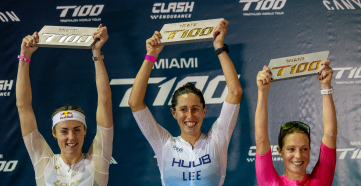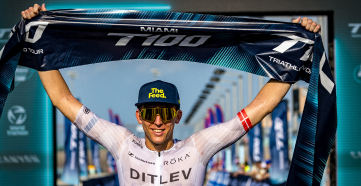This weekend we had some exciting races with PTO athletes lighting things up in New Zealand, Australia and London.
At Ironman New Zealand on the shores of Lake Taupo, Braden Currie (PTO #11) and Hannah Wells (PTO #29) proved the best of an all-Kiwi field. Meanwhile, at 70.3 Geelong, southwest of Melbourne, Australia, it was Steve McKenna and Ellie Salthouse (PTO #21) who came out on top.
Finally, PTO #2 Lucy Charles-Barclay proved herself more than a match for her short-course counterparts by taking silver at the Super League Triathlon Arena Games.
Ironman New Zealand 2021 Race Results
Men’s Podium
Braden Currie (PTO #11) – 7:57:13 (swim 47:30 /bike 4:23:47 /run 2:40:47)
Mike Phillips (PTO #25) – 8:06:39 (swim 47:49 /bike 4:23:29 /run 2:49:52)
Kyle Smith (PTO #33) – 8:08:54 (swim 46:33 /bike 4:23:49 /run 2:51:40)
Women’s Podium
Hannah Wells (PTO #29) – 9:01:50 (swim 53:55 / bike 4:50:41 / run 3:10:51)
Rebecca Clarke – 9:15:39 (swim 48:39 / bike 5:02:09 / run 3:17:41)
Emily McNaughtan – 9:38:43 (swim 1:01:05 / bike 5:12:23 / run 3:17:49)

The Big Stories
Men’s race
While 23-year-old Kyle Smith (PTO #33) had nearly a minute’s lead coming out of Lake Taupo, previous IM NZ winners Braden Currie (PTO #11) and Mike Phillips (PTO #25) were in hot pursuit once on two wheels.
2017 champ Currie took first by 90km and the trio rolled together until T2 where Currie’s snappy T2 was decisive, putting him 20-seconds up the road and out of sight. From here, Currie’s swift 3:49/km average pace put him on track for a stellar 2:40:47 marathon and victory in 7:57:13. This was just three minutes shy of the Ironman New Zealand course record of 7:54:17, set by Joe Skipper (PTO #7) in 2020.
Behind, Smith paced off 2019 winner Phillips until the elastic snapped around 15km in. Phillips ran on strong for second while Smith came home two minutes back with a creditable first-time Ironman marathon of 2:51:40.
Having lost his last two middle-distance races to Smith, Currie’s victory reasserts his position as New Zealand’s strongest full-distance athlete. But with the Collins Cup being shorter, Smith could well be on the shortlist for a Captain’s pick.
Women’s race
The women’s race was a show of class for first time Ironman Hannah Wells, who came into the event having won her last four middle-distance races.
Despite coming out the water over five minutes behind Rebecca Clarke, who blitzed the 3.8km swim in 48:39, Wells found the front of the race just past halfway on the bike and only built on her advantage from there.
Already seven minutes ahead of Clarke coming out of T2, a 3:10:51 marathon meant she crossed the line in 9:01:50, a victory margin of nearly 14 minutes. Clarke meanwhile enjoyed a second-place buffer of over 20 minutes to iron-rookie Emily McNaughton.
This first full-distance victory will surely provide a PTO World Rankings boost, but Wells is no stranger to the top of the podium. Since 2017, Wells, who holds a doctorate in engineering, has won nine middle-distance events, including four 70.3s, and been on the podium every time she’s crossed the finish line. That’s a serious resume for the Team Internationals captains to take notice of.

Ironman 70.3 Geelong 2021 Race Results
Men’s Podium
Steve McKenna – 3:46:46 (swim 23:18 / bike 2:08:36 / run 1:10:54)
Trent Thorpe – 3:47:39 (swim 21:34 / bike 2:10:04 / run 1:11:48)
Tim Reed (PTO #31) – 3:49:23 (swim 23:21 / bike 2:08:27 / run 1:13:29)
Women’s Podium
Ellie Salthouse (PTO #21) – 4:09:30 (swim 25:01 / bike 2:19:19 / run 1:19:05)
Amelia Watkinson (PTO #18) – 4:14:18 (swim 25:12 / bike 2:20:36 / run 1:24:18)
Grace Thek – 4:18:52 (swim 25:06 / bike 2:28:30 / run 1:20:40)

The Big Stories
Men’s race
In the men’s race, the field’s lone Kiwi, Trent Thorpe led out the water with regular merman Josh Amberger. The pair started the bike with a 50-second advantage, which was slowly eroded by chasers including Steve McKenna, Tim Van Berkel and Tim Reed.
McKenna put in a big turn to help the group close to the leaders by around 70km, forming a group of seven that went on to hit T2 in procession.
Tim Reed set the pace out of transition, clocking 3:20/km to quickly dispatch all but McKenna, Van Berkel and Thorpe. McKenna pushed ahead by the 7km mark, slicing another 10sec/km off the pace to turn up the heat and put Van Berkel out of podium contention.
From there, McKenna continued to solidify his lead, crossing the line to take his first ever 70.3 victory in 3:41:53, 50 seconds clear of Thorpe, while Tim Reed secured third.
“I made many tactical errors in Husky,” reflected McKenna at the finish. “I’ve gone no-socks to make sure I’m not as slow in transition and I’ve paced myself. Instead of running 3:05 per K, I jogged the start… and then didn’t really put the hammer down, just stayed at the same level and everyone started dropping off.”
While already ranked #58 and recognised as a powerful force at races down under, this first M-dot win for McKenna will certainly catch the eyes of the Collins Cup’s Team Internationals captains.
Women’s race
In the women’s race, Ellie Salthouse was first out the water with company including Grace Thek, Stephanie Demestichas and Amelia Watkinson for company, the quartet one minute clear.
Once they’d hit the highway, we had something of a re-run from the PTO-supported Big Husky race a few weeks prior. Salthouse and Watkinson proved themselves the best bikers in the event, creating a gap that bloomed to nearly six minutes on third place Penny Slater by T2.
Watkinson hit the run first, but Salthouse soon had a commanding lead that no-one could match. Meanwhile Thek overcame a 1:50 deficit to take the third spot from Slater.
Ahead, Salthouse didn’t look under pressure for a moment as her advantage stretched to over five minutes. The Australian Long-Course Champion took the tape in 4:09:30, adding the Ironman 70.3 Geelong title to her resume after coming second here in 2019.
“I was a bit surprised with that actually,” said Salthouse at the finish. “I had a less than ideal prep leading into this after Husky a few weeks back, so to come out and run a 1:19 – I was super stoked with that and definitely wasn’t expecting it. This is my third win of the year so I couldn’t be happier with that.”
Second place went to Watkinson, the Kiwi once again denied victory by her Collins Cup Team Internationals rival. Another four minutes back and having closed the gap to Watkinson by that same figure on the run, Grace Thek took third – her fourth consecutive podium in Geelong.
Salthouse is now two-for-two against Watkinson and with both athletes hovering around the borderline for automatic Collins Cup qualification, this could tip the tables in the Australian’s favour.

Charles-Barclay ‘Goes Short’
Following her second place at CHALLENGEMIAMI, Lucy Charles-Barclay (PTO #2) decided to shake things up at the Super League Triathlon Arena Games in London last weekend.
Known for her exceptional swimming ability, Charles-Barclay battled against former Olympic runner Beth Potter, 2020 World Triathlon Champion, Georgia Taylor-Brown and other short-course class-acts like Rachel Klamer and Sophie Coldwell. The event featured three short back-to-back races including a 200m swim, 3.8km bike and 1km run.
In the first swim-run-bike event, Charles-Barclay led out the water – breaking Jessica Learmonth’s swim record set in Rotterdam – but was pipped to third by Potter and Coldwell on the bike. She came back strong in the second round’s run-bike-swim format, destroying the competition in the pool to take the win.
In the final bike-swim-run event, Charles-Barclay took a few seconds’ lead onto the final 1km run and while Potter’s foot speed proved too fast for her, she held off two-time Olympian Rachel Klamer to secure second overall.
While it’s super short and there were no PTO World Rankings points on offer, the performance underlines Charles-Barclay’s versatility and tactical mindset. These characteristics could be key ingredients in whichever match-up she faces in the Collins Cup this August.


















